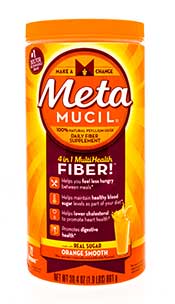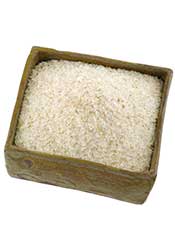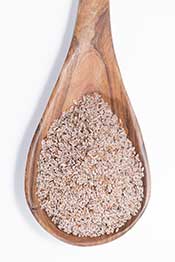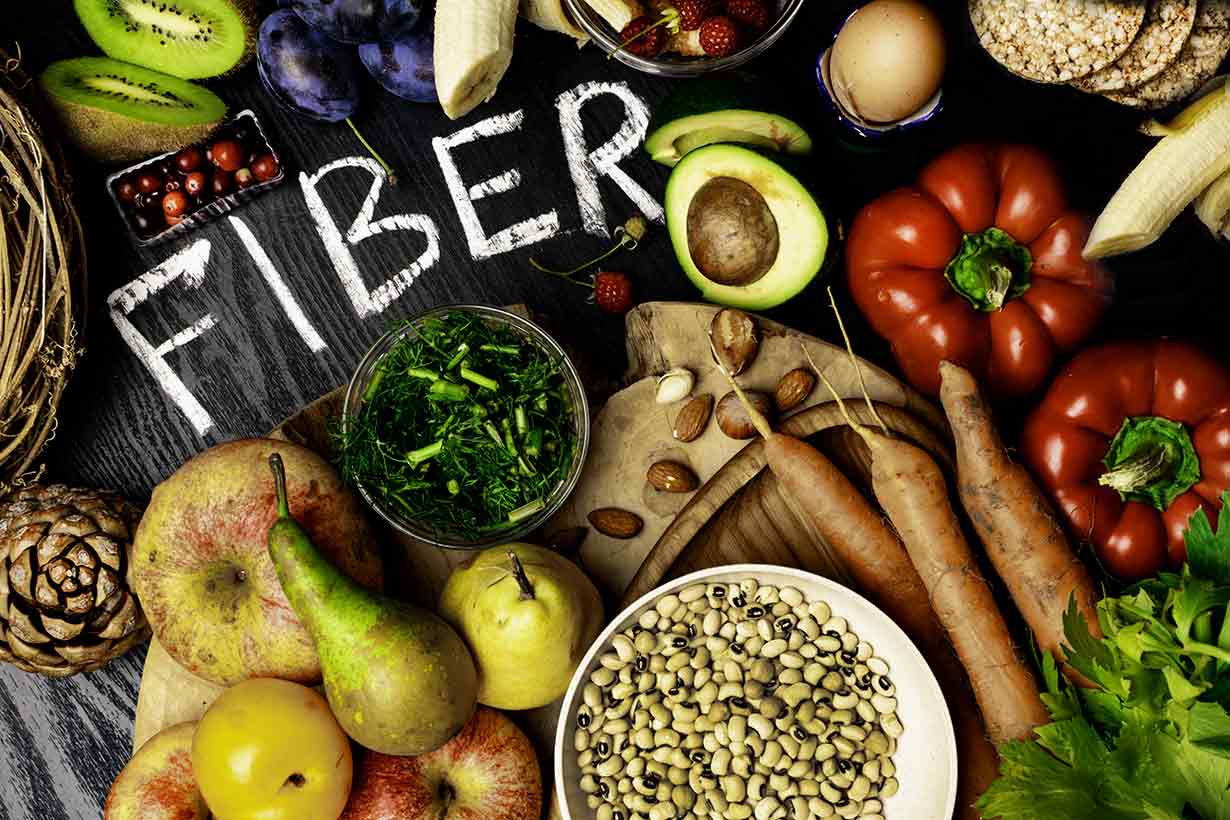
Fiber is an important type of carbohydrate.
For men, health authorities advise 38 grams of fiber per day and around 25 grams for women (1).
Many people who feel they aren’t getting enough fiber from food opt to use fiber supplements.
Others look to increase their fiber intake to help fight digestive problems such as constipation.
This article looks at the pros and cons of the most common fiber supplements and concludes on whether fiber supplementation is a good or bad idea.
What is Fiber?
First of all, fiber is a kind of non-digestible carbohydrate.
As a result, it does not contribute to blood sugar levels in the same way that digestible carbs do (2, 3).
We can categorize fiber as either soluble or insoluble. Also, it can be both fermentable or non-fermentable.
Soluble Fiber
This type of fiber easily dissolves in water to form a gel-like consistency in the stomach.
It is also fermentable, which means that the “good” bacteria in our gut can feed on it.
Insoluble Fiber
As you can tell from the name, insoluble fiber doesn’t dissolve in water. However, it can be either fermentable or non-fermentable.
You may have heard of resistance starch, which is one type of fermentable insoluble fiber.
Non-fermentable fiber passes through the digestive system undigested and supposedly helps with “regularity.”
Lots of healthy fruits and vegetables contain significant amounts of fiber, such as spinach, berries, and avocados.
Whole-grain and legumes products also contain fiber.
What Are Fiber Supplements?

There are various fiber supplements on the market, and they take the form of pills, capsules, and powders.
As their primary use is to assist with the digestive process, they are also known as ‘bulk-forming laxatives.’
Here is an overview of the main types of fiber supplement, whether they are soluble or insoluble, which supplements they are in, and whether they are natural or synthetic;
| Type of Fiber | Solubility | Found in | Source |
| Acacia Gum | Soluble | Various | Natural |
| Calcium Polycarbophil | Insoluble | FiberCon | Synthetic |
| Flaxseed | Both | FibreSmart | Natural |
| Inulin | Soluble | Fiber Choice | Natural |
| Methylcellulose | Soluble | Citrucel | Synthetic |
| Psyllium | Both | Metamucil | Natural |
| Wheat Dextrin | Soluble | Benefiber | Natural |
In addition to the supplements these fibers are found in, you can buy many of them as a bulk powder.
Acacia Gum
Acacia gum (otherwise known as acacia arabic) is hardened sap extracted from various species of Acacia trees.
Sources suggest that it has a long history and played a medicinal role in ancient Egypt.
It has a sticky texture, and as a soluble fiber, it dissolves well in water. In supplement form, we can commonly find it as acacia fiber powder or in capsules.
Also, the food industry uses acacia gum as an emulsifier (E414) due to its thickening and stabilizing properties (4).
Benefits
- Ingestion of 10-15g acacia gum for ten days resulted in an increased number of beneficial gut bacteria. In addition, there were no statistically significant side effects at doses under 30g (5).
- A randomized, double-blind controlled trial assigned 130 IBS (irritable bowel syndrome) patients to either a daily yogurt containing acacia fiber, or a plain yogurt without acacia control. After 8-weeks, the improvements in IBS symptoms was “significantly higher” in the acacia group (6).
- A 10-40g daily dose significantly reduces inflammation and blood pressure in chronic kidney disease patients (7, 8).
Drawbacks
- A daily acacia gum dose of over 30g may cause several digestive upsets such as mild diarrhea, abdominal bloating and flatulence. However, these side effects were not severe (5, 9).
Calcium Polycarbophil

Calcium polycarbophil is a synthetic fiber supplement (10).
The main use of the product is to treat constipation and other digestive issues.
Benefits
- In a study involving 57 patients, calcium polycarbophil led to either a “very good” or “good” improvement in 91% of chronic constipation cases (11).
- In a randomized, double-blind trial comparing calcium polycarbophil to a placebo, 71% of participants chose polycarbophil as the most effective for treating IBS. Additionally, animal studies show that the supplement has no serious side effects (12, 13).
Drawbacks
- Potential side effects may include mild abdominal discomfort, bloating, and flatulence (14).
Flaxseed

Flaxseeds are a whole food form of fiber.
Notably, this means that they are not just fiber and also contain a wealth of naturally occurring nutrients.
In particular, flaxseed is a significant source of essential minerals such as magnesium, copper, selenium, and manganese (15).
Flaxseed powders are available as both powders and capsules, and flaxseed is the main ingredient in the ‘Fiber Choice’ supplement.
Benefits
- Research from human and animal studies shows that flaxseed helps to ease constipation and IBS symptoms (16, 17, 18, 19).
- Evidence from various studies suggests flaxseed contributes to reducing chronic disease risk. However, this is likely from the nutrient-density rather than the specific fiber content (20).
Drawbacks
- A randomized, controlled trial analyzed the effect of adding flaxseed to the diet of IBS patients. The results showed no statistically significant benefits, and no changes in bowel habits (21).
- A review of the evidence states that most of the studies on flaxseed are poor, pointing out that “the available literature does not support recommendations for any condition at this time” (22).
Inulin
Belonging to the fructan family of carbohydrates, inulin is a water-soluble fiber found in many fruits, roots, and vegetables.
Inulin also has prebiotic properties, which means that the beneficial bacteria in our gut can digest it for energy.
The supplement ‘Fiber Choice’ contains inulin.
Benefits
- Various randomized and controlled trials show that inulin improves stool frequency in chronic constipation patients (23, 24, 25).
Drawbacks
- Similar to other fiber supplements, side effects are possible and typically include bloating, cramping, and flatulence (26).
Methylcellulose
Methylcellulose is one of the two popular synthetic fiber supplements.
Derived from plant cellulose, this supplement is a soluble fiber that enjoys popularity under the brand name of ‘Citrucel.’
Benefits
- There is only one clinical controlled trial on methylcellulose, but it shows that a 1-gram daily dose is “an effective laxative” and increases stool frequency at a statistically significant rate (27).
Drawbacks
- There is a distinct lack of research on methylcellulose, and other small trials show no statistically significant benefit (28).
Psyllium
This fiber is otherwise known as psyllium husk and originates from the seeds of a plant named Plantago ovata.
The outer layer of these seeds is used to make psyllium, and they are incredibly rich in soluble fiber.
Psyllium husk is the main ingredient in the supplement Metamucil, and it is also available as a bulk fiber powder.
It is possible to dissolve the psyllium powder into drinks like tea, coffee, and smoothies.
Benefits
- A range of randomized, controlled trials shows that psyllium promotes regularity and helps ease symptoms of chronic constipation (29, 30, 31, 32).
- Studies show that psyllium can help treat irritable bowel syndrome and irritable bowel disease (33, 34).
- A variety of research suggests that psyllium increases HDL levels, decreases blood glucose and blood pressure levels. These are all associated with a reduction in cardiovascular risk (35).
Drawbacks
- Randomized, controlled trials show that mixed fiber from fruit sources and prunes (dried plums) are more effective than psyllium for treating constipation (36, 37).
Wheat Dextrin
Wheat dextrin is a fiber sourced from wheat starch.
It is a form of soluble fiber, and it’s available over-the-counter under the brand name of ‘Benefiber.’
Despite this, there is little available research on the efficacy of wheat dextrin
Although the product states it is gluten-free, it does contain trace amounts of gluten. As a result, anyone who has celiac disease or gluten sensitivities may wish to look elsewhere.
Risks: Can Fiber Cause Harm?
Despite the overwhelming belief that fiber is essential, it isn’t just black and white.
One of the reasons why is that fiber can slow stomach emptying, and cause irritation to an already sensitive digestive tract.
For instance, reducing the amount of fiber has been shown to decrease symptoms of constipation.
In one study, 63 participants were suffering from chronic constipation with an average bowel movement of once per 3.75 days.
Following an explanation of the possible risks of dietary fiber, these patients were told to eat as little fiber as possible for six months;
- 41 patients completely stopped eating all sources of fiber – whether grains, fruits, or vegetables.
- 6 patients reduced their dietary fiber intake
- 6 patients kept a high dietary fiber intake
Results
Following six months of the new diet, these were the results (38);
| Group | Average Bowel Frequency Before Trial | Average Bowel Frequency After 6 Months | Change |
| No Fiber | Once per 3.75 days | Once per 1.0 days | -2.75 |
| Reduced Fiber | Once per 4.19 days | Once per 1.9 days | -2.29 |
| High Fiber | Once per 6.83 days | Once per 6.83 days | 0 |
The results suggest that fiber may do more harm than good for some pre-existing digestive issues.
The researchers explain this by using an analogy of traffic on a busy road;
The role of dietary fiber in constipation is analogous to cars in traffic congestion. The only way to alleviate slow traffic would be to decrease the number of cars and to evacuate the remaining cars quickly. Should we add more cars, the congestion would only be worsened. Similarly, in patients with idiopathic constipation and a colon packed with feces, reduction in dietary fiber would reduce fecal bulk and volume and make evacuation of the smaller and thinner feces easier. Adding dietary fiber would only add to the bulk and volume and thus make evacuation even more difficult.
Source: https://www.ncbi.nlm.nih.gov/pmc/articles/PMC3435786/
There is also further evidence that treating IBS with fiber may be sub-optimal;
- A meta-analysis of fifty-one double-blind clinical trials provides insufficient evidence to recommend fiber supplements (39).
- Out of seven randomized studies investigating the use of fiber supplements to treat abdominal pain in children, none provide high-quality evidence of effectiveness (40).
- A systematic review of randomized controlled trials between 1966 to 2002 suggests that fiber has little benefit in treating irritable bowel syndrome. Additionally, it can even worsen the situation (41).
Does This Mean “Fiber is Bad”?
No, but it does mean fiber may not always help ease digestive issues.
This likely depends on the individual, their specific symptoms, the type of fiber, and the diet as a whole.
But it is something to be aware of and, if applicable, discuss with your medical team.
 What Fiber Supplement is Best?
What Fiber Supplement is Best?
So, you’ve decided to try fiber supplements, and you’re wondering which one is the best?
First, there are a few things to consider;
- Some people appear to respond well to fiber supplements, while others don’t.
- The evidence suggests that a fiber supplement may be either effective, ineffective – or could even make things worse.
- Despite all the positives we hear about fiber, there is a difference between fiber in real food and isolated fiber in a supplement.
If I felt more fiber would be helpful, I would opt to get it from my diet.
However, if I wanted to try some fiber supplements, I would choose psyllium.
The three most important reasons for this are;
- Psyllium husk has the most clinical evidence behind it
- It contains both soluble and insoluble fiber (as most foods do)
- Studies suggest side effects are less likely than other fiber supplements
If you try psyllium (disclosure: affiliate link), be sure to stick to the recommended dosage (10 – 20g per day) and drink enough water with it.
Fruit and Vegetable Sources of Fiber
If upping fiber intake from whole food seems a better option, then here are some of the highest fruit and vegetable sources of fiber (42);
| Food Source | Fiber per 100g |
| Artichoke | 8.6 |
| Avocado | 6.7 |
| Raspberries | 6.5 |
| Blackberries | 5.3 |
| Parsnips | 4.9 |
| Collard Greens | 4.0 |
| Brussels Sprouts | 3.8 |
| Kale | 3.6 |
| Broccoli | 3.6 |
| Olives | 3.2 |
In addition to fiber, these foods all contain beneficial vitamins, minerals, and polyphenols as well.
Final Thoughts
There are many fiber supplements on the market, and they all make various promises.
However, they are not a magic bullet and may not always give the expected results.
In my view, getting nutrients from real food is always the best bet – and that goes for fiber too.


 What Fiber Supplement is Best?
What Fiber Supplement is Best?

